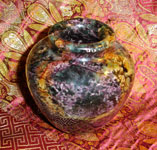
Taking Action by Deborah Beach Giordano
In Memory of Her
 As theologian Elisabeth Schussler-Fiorenza pointed out over 20 years ago, although Jesus insists that what the woman did will be retold wherever the good news is proclaimed, that’s not true. In fact, her action has generally been treated as an aside; a footnote to the gospel of Jesus. Disturbingly, not even her name remains for us to “remember.”
As theologian Elisabeth Schussler-Fiorenza pointed out over 20 years ago, although Jesus insists that what the woman did will be retold wherever the good news is proclaimed, that’s not true. In fact, her action has generally been treated as an aside; a footnote to the gospel of Jesus. Disturbingly, not even her name remains for us to “remember.”
In Mark’s terse gospel the woman arrives after the meal has begun, anoints the Lord with expensive perfumed oil, endures the scolding of the angry guests, and then disappears. We never see her again.
The woman never says a single word.
She does not introduce herself, and no one else seems to know who she is; we do not know where she came from or where she goes afterward. We have no idea if the woman is rich or poor, old or young, full of health or bowed down with sickness. She doesn’t say if she came of her own accord or was sent by another. We don’t even know why she poured the fragrant oil over the Lord’s head ...
And neither do the disciples, until Jesus explains the significance of what she has done.
Silence
 He tells them that she has anointed his body for burial.
He tells them that she has anointed his body for burial.
Jesus says that she has done a beautiful and good thing for him. It is a gift that can be given only for a short time — only while he is present with his friends and family. He tells them that he won’t always be with them.
The disciples’ response to what Jesus says is far more surprising than the woman’s action. There is silence.
No one says anything. No voices are raised in protest, no one seems shocked or even mildly distressed. There is no trace of anything like Peter’s outraged denial that any harm could come to the Messiah (Mark 8:31-33, also Mt 16:21-23).
What in the world is going on?
Convenient Deafness
 Did those assembled around the table really hear what the Lord said, or had they stopped listening? Did they think to themselves, “There he goes again, with that gloom and doom business. Not a day goes by that he doesn’t talk about dying. This is getting tedious.” “Maybe his blood sugar is low.”
Did those assembled around the table really hear what the Lord said, or had they stopped listening? Did they think to themselves, “There he goes again, with that gloom and doom business. Not a day goes by that he doesn’t talk about dying. This is getting tedious.” “Maybe his blood sugar is low.”
Perhaps it was because, despite his repeated references to his impending death, nothing had (yet) happened. Maybe the disciples had started to overlook these comments, considering them as unnecessarily dramatic. Perhaps they didn’t realize just how controversial Jesus’ Message was, and how violently the authorities would respond. Did they think, “He’s young yet, and takes everything too seriously. He’ll be around for another 50 years.”?
Maybe they weren’t really listening, but were caught up in their own thoughts. They might have been remembering past adventures or dreaming of future glories. Perhaps they were thinking about getting a broken sandal strap mended, planning for the upcoming Seder dinner, or worrying about where they would spend the next night.
 Or were they intentionally avoiding the implications of what the Lord was saying, because they didn’t want to hear that his ministry was going to be cut short? We humans have a particular fondness for that form of escapism: “If only we ignore this, it will just go away.”
Or were they intentionally avoiding the implications of what the Lord was saying, because they didn’t want to hear that his ministry was going to be cut short? We humans have a particular fondness for that form of escapism: “If only we ignore this, it will just go away.”
Here We Are
Of course we are nothing like those first disciples. If we were sitting there at dinner with the Lord, we would value every moment that we spent in his presence. We would listen attentively and respond with compassion and understanding to every comment that he made. We’d never ignore what he said, we’d never be deaf to his teachings, we’d never be thinking about anything else when Jesus was speaking to us.
But I wonder.
How many of the Lord’s teachings do we ignore every day?
Time is of the Essence
 Jesus tells the disciples that he won’t always be there with them; soon his earthly ministry will draw to a close. In just a few hours Judas Iscariot will arrange with the priests to betray the Lord: the end is near — far closer than they can possibly imagine. But the disciples go on, eating and drinking ... as if they have all the time in the world.
Jesus tells the disciples that he won’t always be there with them; soon his earthly ministry will draw to a close. In just a few hours Judas Iscariot will arrange with the priests to betray the Lord: the end is near — far closer than they can possibly imagine. But the disciples go on, eating and drinking ... as if they have all the time in the world.
What of the woman with the alabaster jar — does she realize how soon the Lord’s burial will take place? Does she know that Jesus will be crucified within a day’s time? Is she a prophetess, a seer — an angel who has come to announce to the Lord that his time has come?
Or is she one of us? Older, perhaps; wiser. Someone who understands the sacred value of this very moment. She may be a widow, an orphaned child, the survivor of an earthquake or fire, a refugee from a war-ravaged land. Perhaps she has seen how everything can change in an instant; friends can be swept away, loved ones perish, communities uprooted, families torn apart ... Perhaps she sees life in right perspective.
The expensive perfume isn’t what is important. It truly is “only money” — an object devoid of genuine, meaningful value. What matters is life, rightly lived: celebrated.
Whoever we are, whatever power or authority we may wield, wherever we live, whatever our age — our time here is limited. Life is fragile, precious: a sacred gift to honor and bless. Every second counts, every minute is holy.
We don’t have “all the time in the world.”
Virtual hugs and real-time blessings,
Deborah +
This Week's Spiritual Exercise

This moment in time is the only one we can be assured of. What has gone before is over, tomorrow is not guaranteed to us. Today is a gift: that’s why it’s called “the present.” Use it wisely.
Footnote
Multiple women, multiple anointings: Jesus appears to have had more than one encounter with a “woman with the alabaster jar.” There is an account of an incident in Luke 7:36-50 when an unnamed woman who has been “healed of seven demons” washes his feet with her tears, anoints them with oil, and dries them with her hair. In the gospel of John (12:1-8) it is Mary, the sister of Lazarus and Martha who anoints Jesus’ feet with oil while he is staying at Lazarus’ house.
In Mark and Matthew the unnamed woman anoints Jesus by pouring the oil over his head; in Luke and John, the woman anoints the Lord’s feet. In John she is identified as Mary, in Luke she remains anonymous.